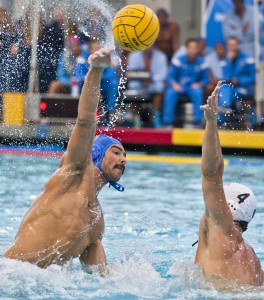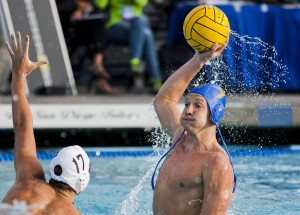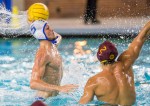Believe it or not, there was a time when the historically excellent UCLA men’s water polo program was not as prominent in the world of the sport as it is today.
It was a time before NCAA regulated collegiate water polo, before a Mountain Pacific Sports Federation, and before seasons that lasted more than twenty games. Instead, the Athletic Association of Western Universities was composed of Stanford, California, Washington, USC and UCLA, and was commonly referred to as the “Big Five.”
It was under these conditions that the 1962 UCLA water polo team opened up AAWU conference play against the USC Trojans, who finished in first place the previous year. The ’61 Bruins? Dead last.
Despite the steep odds against them, the Bruins fought within one goal of their archrival before falling 10-9.
Fifty-three years later and the rivalry matches have been decided by one goal, regardless of the predicament of each team, on too many occasions to count.
Since 2012 alone, one goal has decided the title game of the 2015 KAP7 SoCal Invitational, last year’s national championship, all three meetings in 2013 – two of which were settled in overtime – and all three meetings in 2012.
“Every time UCLA and USC suit up to play each other in any sport, it’s a big deal,” said senior utility Danny McClintick. “But in water polo it’s something special … there’s a lot of history.”
The history dates back almost as far as UCLA’s founding. One year after the university opened as the southern branch of UC Berkeley, UCLA graduate Clyde Swendsen played water polo for Team USA in the 1920 Summer Olympic Games, becoming the first of UCLA’s many Olympians.
Swendsen would become coach of the UCLA men’s water polo team in 1930 and in the 1936 Summer Olympics would head the United States team.
Since those games, the Bruins’ water polo program has sent at least one representative to play or coach for an Olympic team in all but two of the games.
The Trojans themselves have sent coaches and players to all but five of the games, their athletes especially dominating the Olympic rosters of the 1950s. They sent six water polo players to the ’52 games, seven to the ’56 games, and five to the ’60 games.
It was in the aftermath of USC’s impressive Olympic resume that Bob Horn began coaching the UCLA team in 1962, changing the landscape of Bruin water polo.
Over Horn’s first three seasons, his Bruins beat nearly every team they faced on a regular basis except for the Trojans. In 1965, UCLA opened up conference play at home against their crosstown rivals, who had finished first in the league the previous season.
This time however, there would be a different ending. The game was tied at two through the first two quarters. UCLA scored two in the third and fourth quarters and, though USC staged a late comeback, UCLA hung on for a 6-5 win. In just those three short years, Horn had led the Bruins out of a last-place finish to topple the top-ranked team in the country.

Later in the 1965 season, the men’s water polo team traveled to the heart of Los Angeles and pulled out a 7-6 overtime conquest, marking the first time on record the Bruins beat the Trojans in USC’s home pool.
Thus began a winning streak that spanned three seasons for the Bruins and, if it weren’t for a 12-5 finish in 1968, Bruin water polo fans would not have tasted a loss for over five years. In 1969, Horn’s team claimed the first NCAA Water Polo Championship and concurrently began the first men’s water polo team to finish an NCAA season undefeated.
Over a 28-year tenure, Horn compiled 487 wins and three national titles. His team’s 19-8 victory over USC in 1976 remains the largest single-game difference between the two teams on record, followed by an 18-8 win scored earlier that same season.
Daniel Leyson, now coach of the UC Davis men’s water polo team, started for USC during Horn’s last two seasons at UCLA.
“When I was a student at USC, it was like being a student at UCLA,” said Leyson. “You have a deep hatred for (the other school) on a sport level. It’s not a true deep hatred – it’s a competitive dislike.”
Leyson would go on to be an assistant coach at USC from 2000-2002 and at UCLA from 2011-2013. To this day, Leyson remains one of the rare figures to have coached on both sides of the USC-UCLA rivalry.
“It’s definitely an odd sensation, having gone to USC and coached against USC as a coach for UCLA. Very, very strange sensation,” said Leyson. “You don’t really realize how deeply ingrained this competitive dislike goes. It’s almost like you’re trained mentally to not like the other school, and it really has an effect on your brain.”
Leyson finished his collegiate career at USC as a three-time All American, and as the leading scorer of the 1992 NCAA Tournament. While he saw coach Horn retire, he also witnessed the rise of Guy Baker, who coached the Bruins for ten years and led them to four national championships.
Current UCLA coach Adam Wright played for UCLA from 1997 to 2000, helping them win two of those titles. Although he was not on the 1996 team, Wright remembers what led up to what would be that year’s biggest rivalry face-off.
“UCLA came off its first championship in 20-plus years in ’95,” Wright said. “We had a good amount of the team back, we did a great job through the MPSF regular season which got us a chance to be (in the NCAA tournament) because in the conference tournament we didn’t do so hot.”
The Bruins got sixth place at the MPSF Tournament, but a 21-4 regular season record landed them a first-round game against UC Davis at the NCAA Tournament. After a convincing 18-6 win, they faced rival USC in the NCAA Championship for the first time in history, and won 8-7.
Five years later, Baker left the men’s program in the hands of Adam Krikorian after the two shared head coaching responsibilities from 1999 to 2000. Sticking true to the historical closeness of rivalry games, 10 of the 20 games Krikorian’s Bruins played against the Trojans over his ten year stead ended in one-goal margins. Only four of those 20 games had a score difference greater than two points.
Since Wright took over for Krikorian in 2009, 15 of his 25 games against USC have been decided by one goal, more than two goals separating the teams only six times.
“They’re always going to be that way. It’s a chess game,” Wright said. “This is a real high-level game experience for these guys, and when it’s always coming down to one goal it puts pressure on both teams … and we look forward to that challenge.”
Two of the more painful one-goal games have come when an NCAA title was on the line. In 2009, Wright’s first year as head coach, the Bruins lost to USC 7-6. The same happened three years later in 2012 by a score of 11-10.
Those one-goal victories helped spur USC to six consecutive championship trophies, a run that would become the fourth-longest title streak in any NCAA men’s sport since 1943.
That run came to an end last year when UCLA usurped the six-time defending national champions 9-8. Then-sophomore attacker Patrick Fellner laced a half-tank skip shot at the end of the third quarter past USC goalie McQuin Baron, then-sophomore goalie Garrett Danner recorded nine saves, and McClintick scored four goals and sent the game winning assist to then-sophomore center Gordon Marshall with 34 seconds left.

“My favorite moment of that game was when we called a timeout after the game had been tied,” McClintick said. “We were so confident and so calm and collected even though we kind of squandered away a lead at that point, but the way that we came into the huddle, and just the look in everyone’s eyes that we knew we were still in a good place and still right where we wanted to be in that game.”
And so, with old and new faces, UCLA squares up with an 80-77-1 all-time record against USC on Sunday.
Even the new freshmen, such as attacker Spencer Farrar, understand what Sunday will mean for UCLA water polo.
“I’m going to enjoy the atmosphere a lot,” said Farrar. “I’m going to take it all in. It’s a great experience.”
